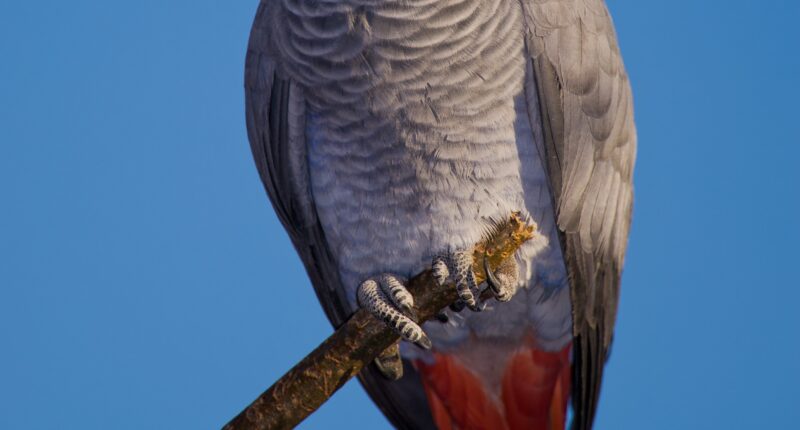HE is on a mission to help our pets . . . and is here to answer YOUR questions.
Sean, who is the head vet at tailored pet food firm tails.com, has helped with owners’ queries for ten years. He says: “If your pet is acting funny or is under the weather, or you want to know about nutrition or exercise, just ask. I can help keep pets happy and healthy.”
Q) OUR 27-year-old African grey parrot Basil is extremely talkative and in very good health.
He likes a bit of our food but we also make sure he has his own parrot mix and fresh sunflower seeds.
But the last six months he has been losing some of his flight feathers.
He can fly down to things but has difficulty flying back, if at all. Is there anything we can do?
Val and Colin Brittle, Burton on Trent
Sean says: Nutritional deficiencies are common in captive parrots, and happen very gradually over time.
We tend to only notice when a symptom as drastic as feather loss finally occurs.
Unfortunately we’ve been sold a lie on most parrots and cage birds in terms of appropriate nutrition.
Most read in Money
Bird seed is not a complete and balanced diet, and even worse, many birds will selectively feed from these mixes of seed, eating only their favourite bits.
Often they pick the sweet or fatty elements, sunflower seeds being a firm favourite.
In my exotic pet vet days I met many parrots who had become sunflower seed junkies, ending up obese with serious nutritional deficiencies.
Try to convert Basil slowly to a more natural diet of vibrant colourful vegetables, a small amount of fruit, a tiny amount of mixed seed and the staple of his diet being a complete and balanced pelleted parrot food, appropriate for his species.
I have no affiliation but can recommend Harrison’s as a good option. A vet check is also a good idea.
Got a question for Sean?
Q) MY son’s eight-month-old Patterdale Terrier Benji uses his paw to tip his feeding bowl over then eats the dried food off the floor.
If my son tries to pick up the food he knocks him away with his nose.
We don’t know why he does this.
A Google search suggested he is looking for something more exciting or does not like the ceramic bowl. Any ideas?
Polly Rose, Northampton
Sean says: Puppies do like to explore their food, so it may be that Benji finds the bowl boring, wants to sniff and see each kibble before eating it, or dislikes the ceramic bowl.
I’m a big fan of scatter feeding and using feed puzzle toys.
They don’t have to be shop bought, you can get creative with cardboard boxes, plastic drinks bottles, even old tea towels folded up in various ways or tied with pockets of kibble inside.
Dogs get great mental stimulation from working for their food
Q) MAISIE, my Cocker Spaniel, is two years old but still wants to go out in the middle of the night – sometimes to got to the toilet, other times for a sniff around.
It is not every night but it doesn’t seem necessary as she is taken out last thing before bed.
She eats around 4pm and she is spayed. My other dog is fine.
Do you think it’s just a habit? I’m puzzled.
Sandra Edgell, Cambridge
Sean says: I think she has potentially trained you to be at her beck and call, maybe because she’s bored at night, or kind of needs a wee and the garden is fun to explore.
It’s worth getting a urine sample and asking your vet to check it to ensure she hasn’t got a urinary infection, or even diabetes, although that would be unusual as Maisie is two.
Cockers are prone to this so it is always worth watching out for increased thirst or urination.
It sounds more like she has never grown out of asking to go out at night, so change her routine.
How about moving one of her longer walks to late in the evening, a few hours after her dinner, and then one last toilet break walk around the block allowing plenty of sniffing time, last thing before you both go to bed.
Then try not to respond to her requests to go out in the night.
It may be a battle of wills.
Star of the week
SIBLINGS Jasper and Willow are flying the flag for magnificent moggies.
The duo, who live at St Peter and St James Hospice in Haywards Heath, Sussex, were joint winners of Cat Protection’s National Cat of the Year 2022.
The rescue cats visit patients receiving end-of-life care, helping their loved ones feel at ease.
Cats Protection chief executive John May said: “If any readers have a special cat whom they think deserves recognition, the National Cat Awards would be excited to hear from them.”
See cats.org.uk/national-cat-awards.
WIN: £50 voucher

TO celebrate the launch of its spring range, we have joined forces with Jollyes, The Pet People, to offer five readers the chance to win a £50 voucher to spend online.
From Rufus and Rosie coats for dogs to treats for cats and hay for rabbits, there’s something for everyone.
For a chance to win, send an email headed JOLLYES to [email protected] by February 5. See jollyes.co.uk.
PROTECT OUR PUPS AND THE PUBLIC
AN EXPERT on dangerous dogs is calling for new laws to govern dog walking and other canine professional activities.
Debbie Connolly, an expert court witness in dangerous dog cases and behaviourist, has spoken out in the wake of a 28-year-old dog walker tragically dying last week in Caterham, Surrey.
She said: “I believe legislation is needed to cover dog walking, behaviourists, training, care and daycare.
“We need a national standard for this and all dog activities. At the moment there isn’t one.”
The Control of Dogs Act 2010 permits local authorities to set their own restrictions and the number of dogs a walker can be in charge of, meaning this varies by area.
Debbie, also a Professional Dog Walkers Association advisor, urges readers to make sure their walker is a member of the PDWA or Association of Professional Dog Walkers and Sitters and to thoroughly vet them and their references.
She said: “There are countless brilliant dog walkers in this country.
“The issue is not just determining who’s good and who’s not, but that sometimes they’re unaware of what the dog walker is going to do when they leave.


“Who pays the price? The dogs and the public.”
Visit mydoghasbitten.uk.












